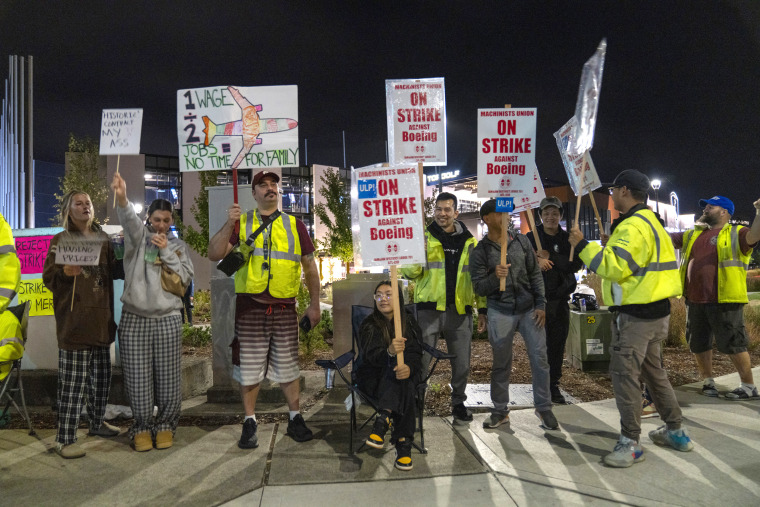Boeing workers went on strike Friday, the latest disturbance in what has proven a devastating year for the American aircraft manufacturer.
But it is not clear whether the labor stoppage will have an impact for the flying public, although there are concerns about a potential effect on air travel next summer.
U.S. carriers that rely heavily on Boeing planes include Southwest, United and Alaska Airlines.
In a statement, Southwest said its operations were unlikely to be affected in the short-term by any production delays Boeing may end up suffering.
“Earlier this year, Southwest Airlines took steps to address potential delivery disruptions," the carrier said. "As a result, we currently have the fleet needed to fulfill our upcoming schedules. We remain in close communication with Boeing.”
Southwest exclusively uses Boeing 737s — planes made made in Renton, Washington, one of the sites now on strike by members of the International Association of Machinists and Aerospace Workers. Southwest had sharply brought down its delivery target for Boeing aircraft earlier this year.

U.S. & World
A United spokesperson said the carrier was working with Boeing to understand what the impact to the airline's delivery schedule might be.
A spokesperson for Alaska Airlines did not immediately respond to a request for comment.
Get a weekly recap of the latest San Francisco Bay Area housing news. >Sign up for NBC Bay Area’s Housing Deconstructed newsletter.
Airlines are in charge of maintaining aircraft once they come into possession of them, and crews won't sign off on allowing a plane to fly if it is deemed not airworthy, said Henry Harteveldt, founder and president of Atmosphere Research Group, an airline industry consultancy.
"There will probably be very little direct impact on consumers as a result of the Boeing strike," Harteveldt told NBC News.
Estimates of how long the strike could last vary widely. The previous Boeing machinists strike, in 2008, lasted nearly two months; however, in a note to clients, Bank of America analyst Ronald Epstein said the latest one could prove as short as a week.
That's in part because Boeing is in an especially weak position, he noted: Its standing has been seriously hurt in the wake of the mid-air door-panel blowout in January that prompted a nationwide grounding, federal investigations, and ultimately the ouster of Boeing’s leadership. The FAA continues to have federal monitors of Boeing's production in place. The company's stock, which is a component of the blue chip Dow Jones Industrial Average, is down about 40% this year.
Newly installed CEO Kelly Ortberg already took a conciliatory tone with Boeing workers in the run-up to the strike, Epstein said.
“We see it likely Boeing would have to make further concessions and move closer to the IAM’s initial proposal,” Epstein wrote.
In a statement, Boeing acknowledged that members of the International Association of Machinists had deemed its offer "not acceptable."
“We remain committed to resetting our relationship with our employees and the union, and we are ready to get back to the table to reach a new agreement.”
Company executives have warned that the strike could “jeopardize” its recovery from recent scandals and quality problems.
A White House official said the Biden Administration is in touch with Boeing and the machinists.
"We encourage them to negotiate in good faith — toward an agreement that gives employees the benefits they deserve and makes the company stronger,” the official said.
The strike was largely expected, despite a push by union leaders to broker a last-minute deal. Rank-and-file members of the 33,000-strong workforce that constitute the striking group have said recent layoffs, a decision to shift some production to Boeing's non-union facility in South Carolina, and a push for even stronger compensation and protections had all pushed workers toward striking. Boeing had promised to build its next commercial airplane in the Seattle area under the tentative agreement.
Boeing appeared to have already made contingency plans in the run-up to the strike vote: Reuters reported on Tuesday that the company told suppliers it was delaying a key production milestone for its 737 MAX by six months.
Should the strike drag on, major carriers may not be able to meet capacity demands for next year's summer travel season, Harteveldt said.
"If this strike drags out, depending on how many aircraft can [Boeing} can deliver, airlines may find themselves with far fewer new planes by next summer's season, which is peak season — and that could definitely impact the number of flights and destinations available," he said.
This story first appeared on NBCNews.com. More from NBC News:



